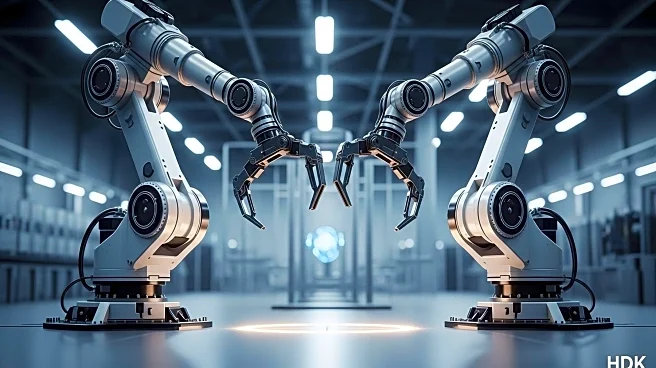What is the story about?
What's Happening?
Ati Motors has introduced its latest innovation, the Sherpa Mecha, a dual-armed mobile manipulator designed for manufacturing applications. This new robot diverges from traditional humanoid designs, focusing instead on high-performance functionality tailored to industrial needs. According to Saurabh Chandra, founder and CEO of Ati Motors, the Sherpa Mecha aims to integrate deeply into customer ecosystems, enhancing information flow, automation, and integration. The robot is designed to be a reliable industrial superworker, capable of tending machines and transporting heavy bins and parts for inspection. Founded in 2017, Ati Motors specializes in autonomous mobile robots (AMRs) with artificial intelligence, serving sectors such as automotive, appliances, aerospace, and electronics. The Sherpa Mecha has undergone rigorous testing on active factory floors, demonstrating reliable performance and easy integration with existing automation lines.
Why It's Important?
The launch of the Sherpa Mecha represents a significant advancement in the field of industrial automation. By moving away from biomimicry and focusing on practical functionality, Ati Motors is addressing real-world manufacturing needs, potentially increasing efficiency and productivity in various industries. The integration of such advanced robotics into manufacturing processes can lead to reduced labor costs and improved precision in operations. Companies in sectors like automotive and electronics stand to benefit from enhanced automation capabilities, which could lead to faster production times and reduced human error. As industries continue to seek ways to optimize operations, the Sherpa Mecha could play a crucial role in transforming manufacturing practices.
What's Next?
Ati Motors plans to continue expanding its product line, which includes tugs, bin movers, pallet movers, and lifting platforms. The Sherpa Mecha is now commercially available, and the company is likely to focus on collaborating with partners to drive further innovation in human-robot interaction. As more companies adopt this technology, there may be increased demand for customized solutions that fit specific manufacturing needs. The success of the Sherpa Mecha could encourage other robotics companies to develop similar products, potentially leading to a competitive market for advanced manufacturing robots.
Beyond the Headlines
The introduction of the Sherpa Mecha highlights the growing trend of integrating artificial intelligence into industrial applications. This shift could have broader implications for the workforce, as automation may replace certain manual tasks, necessitating a reevaluation of labor roles and skills. Additionally, the ethical considerations of increased automation, such as job displacement and the need for retraining programs, may become more prominent as these technologies become widespread. The long-term impact on manufacturing culture and practices could be profound, as companies adapt to new technologies and redefine their operational strategies.















